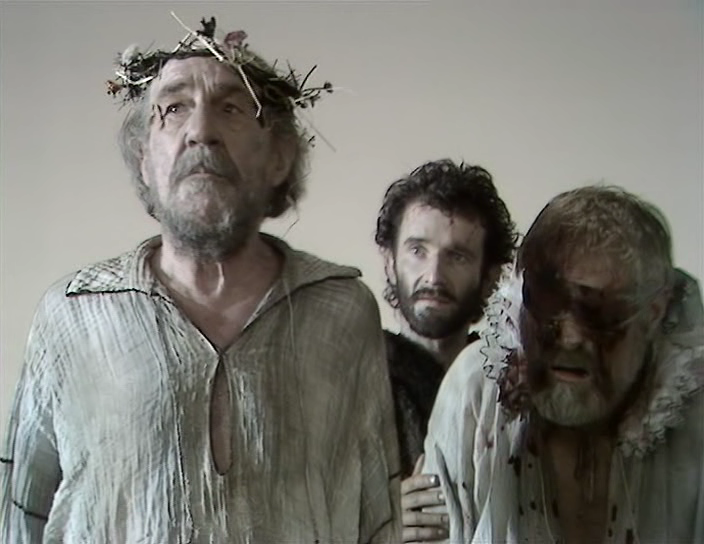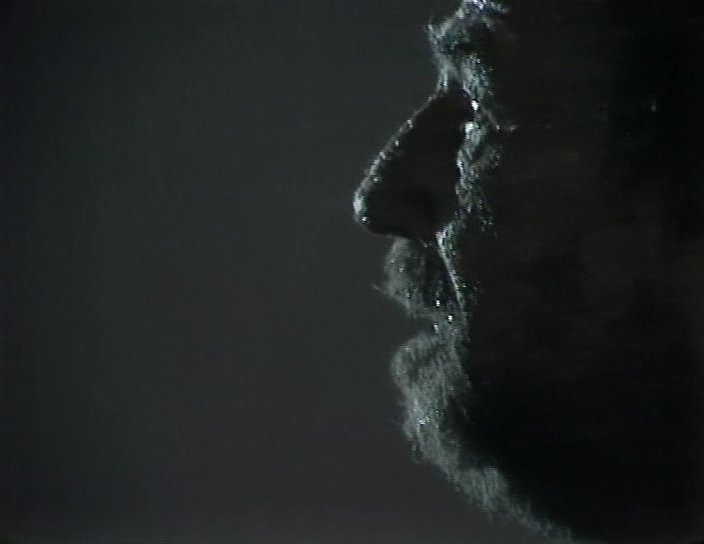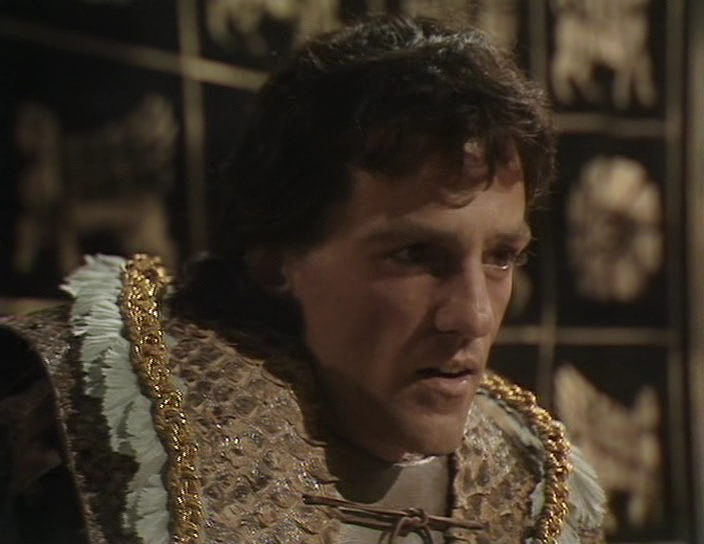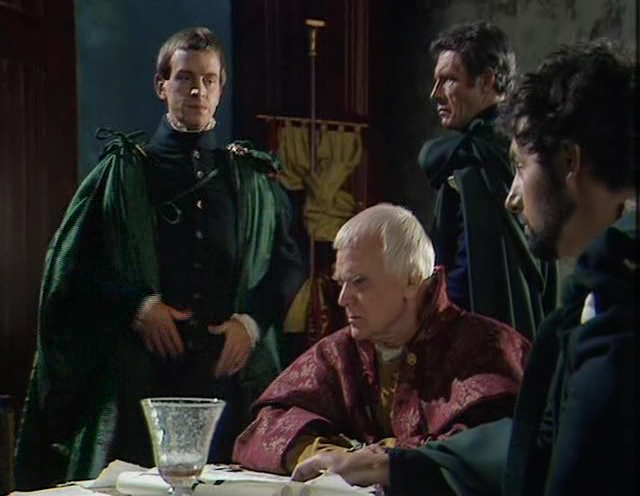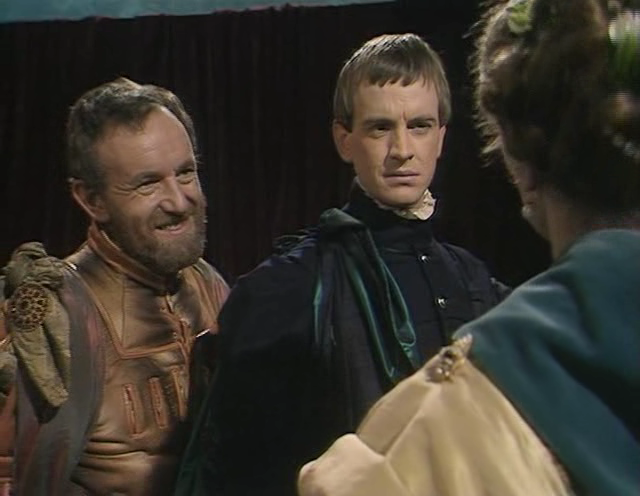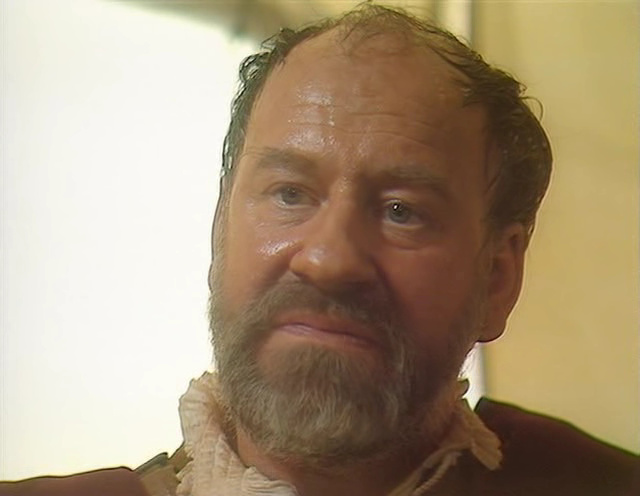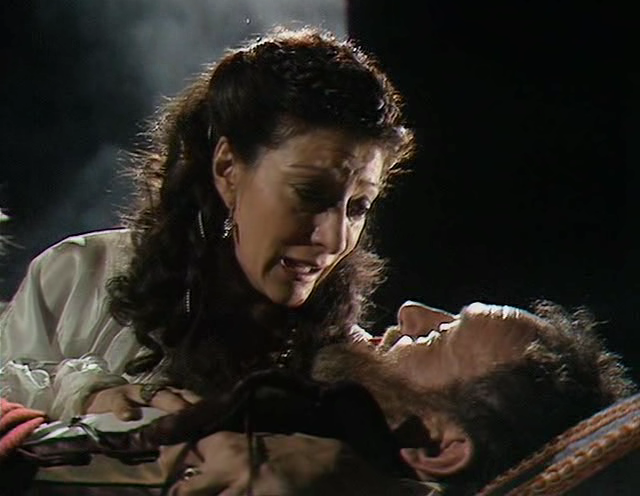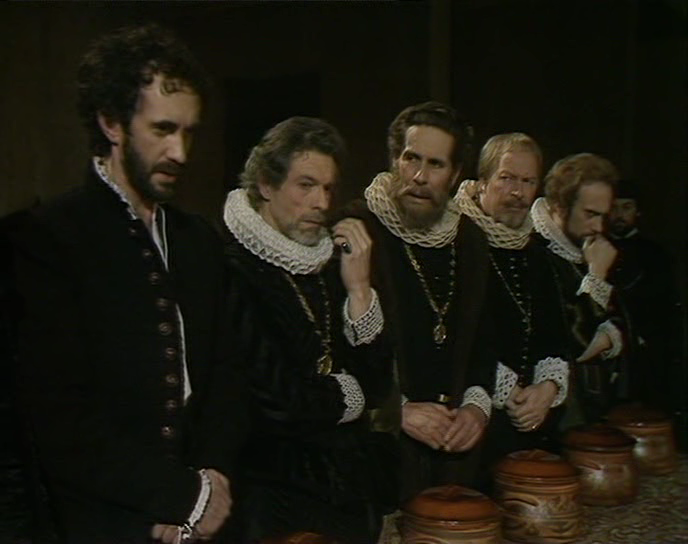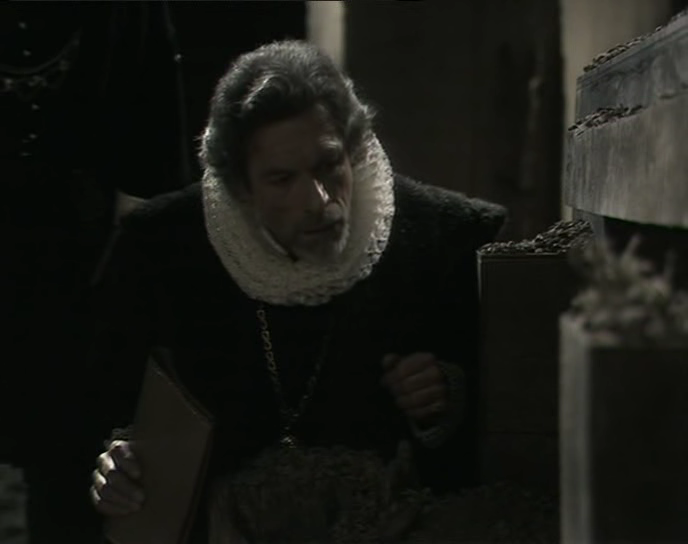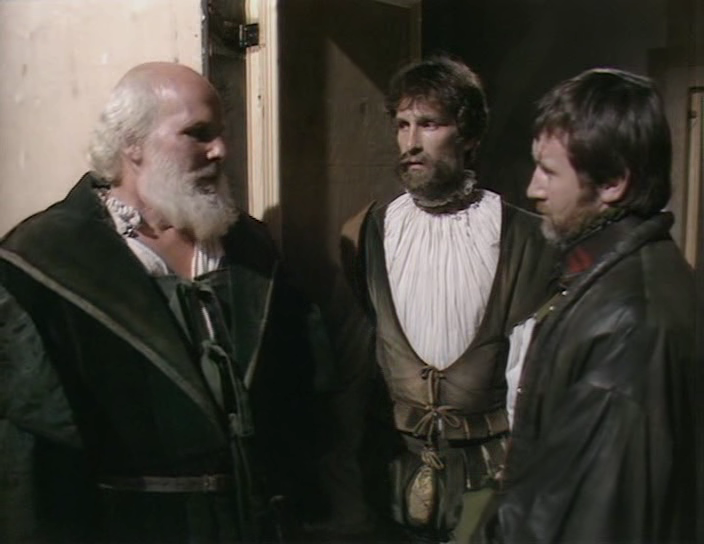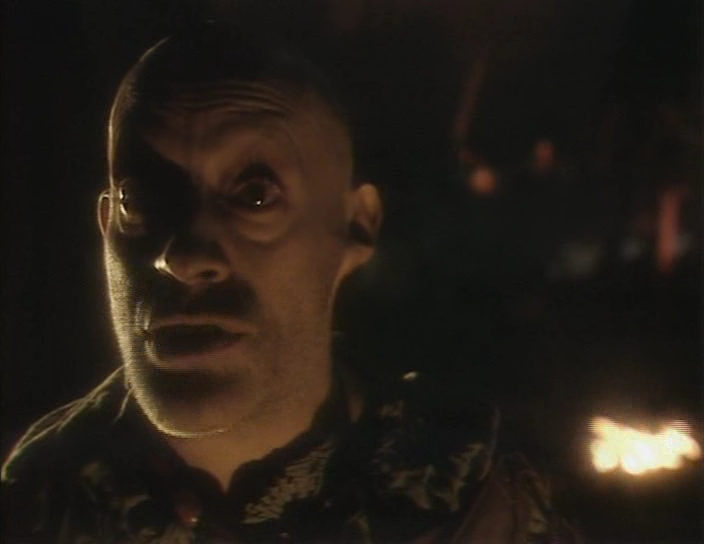
 Making its debut with Romeo and Juliet on 3 December 1978, and concluding nearly seven years later with Titus Andronicus on 27 April 1985, the BBC Television Shakespeare project was the single most ambitious attempt at bringing the Bard of Avon to the small screen, both at the time and to date.
Making its debut with Romeo and Juliet on 3 December 1978, and concluding nearly seven years later with Titus Andronicus on 27 April 1985, the BBC Television Shakespeare project was the single most ambitious attempt at bringing the Bard of Avon to the small screen, both at the time and to date.
Producer Cedric Messina was already an experienced producer of one-off television Shakespeare presentations, and was thus ideally qualified to present the BBC with a daunting but nonetheless enticingly simple proposition: a series of adaptations, staged specifically for television, of all 36 First Folio plays, plus Pericles (The Two Noble Kinsmen was considered primarily John Fletcher's work, and the legitimacy of Edward III was still being debated).
The scale of Messina's proposal, far greater than that of previous multi-part Shakespeare series such as An Age of Kings (BBC, 1960) and Spread of the Eagle (BBC, 1963), required an American partner in order to guarantee access to the US market, deemed essential for the series to recoup its costs. Time-Life Television agreed to participate, but under certain controversial conditions - that the productions be traditional interpretations of the plays in appropriately Shakespearean period costumes and sets, designed to fit a two-and-a-half-hour time slot.
The running-time requirement was swiftly jettisoned when it became clear that the major tragedies in particular would have suffered severely, but other artistic restrictions remained largely in place throughout. Although later productions under Messina's successors Jonathan Miller and Shaun Sutton would be more experimental, Miller was unable to persuade first-choice directors such as Peter Brook and Ingmar Bergman to take part, and Michael Bogdanov resigned from Timon of Athens (eventually tx, 4/16/1981, with Miller himself directing) after his modern-dress interpretation was considered too radical a departure.
This gave the BBC Television Shakespeare cycle the reputation of being overly staid and conventional, which was not always deserved. Though Messina's own productions (1978-80) were largely conservative, Jonathan Miller (1980-82) revamped things both visually (thanks to a design policy of sourcing sets and costumes from great paintings of the era in which the play was set) and in terms of direction and casting, in some cases using popular actors with little or no Shakespeare experience (John Cleese as Petruchio, Bob Hoskins as Iago) to attract new and younger audiences.
Under Miller, directors such as Jack Gold, Jane Howell and Elijah Moshinsky were encouraged to be more adventurous, with Howell in particular adopting such a stylised approach for The Winter's Tale (tx. 8/2/1981) and the Henry VI/Richard III cycle (tx. 2-23/1/1983) that they pushed the definition of "traditional" to the limit, but also garnered the series some of its best reviews. Miller's aesthetic policies continued under Shaun Sutton (1982-85), who brought the project to a belated close.
Whatever its artistic reputation, there was no doubt that the BBC Television Shakespeare was a commercial triumph, breaking even financially by 1982 (ahead of expectations) and fully justifying Messina's gamble. Its success was helped by the rapid growth of video recorders in schools, creating a secondary market that was much bigger than initially predicted - though the initial decision to sell the plays only as a complete set provoked complaints from people who baulked at paying the substantial asking price because they were after a smaller selection or individual titles. The BBC eventually released some of the more popular titles separately, but it was not until late in 2005 that the entire series was available individually on DVD at a competitive price.
Although the BBC Television Shakespeare project as a whole met with a mixed reception, it had several positive virtues. Chief among them was the fact that its completist remit meant that several of the more obscure plays received their first television adaptation, and in most cases the BBC version remains the only one. Happily, such productions as Henry VIII (tx. 25/2/1979), Cymbeline (tx. 10/7/1983), Pericles (tx. 11/6/1984) and Titus Andronicus were considered amongst the cycle's most impressive achievements, with Henry VIII subsequently voted the best production of all by the Shakespeare Association of America.
A complete list of BBC Television Shakespeare productions is as follows:
Series One (producer: Cedric Messina): Romeo and Juliet (tx. 3/12/1978), Richard II (tx. 10/12/1978), As You Like It (tx. 17/12/1978), Julius Caesar (tx. 11/2/1979), Measure For Measure (tx. 18/2/1979), Henry VIII (tx. 25/2/1979)
Series Two (p. Cedric Messina): Henry IV Part One (tx. 9/12/1979), Henry IV Part Two (tx. 16/12/1979), Henry V (tx.23/12/1979), Twelfth Night (tx. 6/1/1980), The Tempest (tx. 27/2/1980), Hamlet (tx. 25/5/1980).
Series Three (p. Jonathan Miller): The Taming of the Shrew (tx. 23/10/1980), The Merchant of Venice (tx. 17/12/1980), All's Well That Ends Well (tx. 4/1/1981), The Winter's Tale (tx. 8/2/1981), Timon of Athens (tx. 16/4/1981), Antony and Cleopatra (tx. 8/5/1981)
Series Four (p. Jonathan Miller): Othello (tx. 4/10/1981), Troilus and Cressida (tx. 7/10/1981), A Midsummer Night's Dream (tx. 13/12/1981)
Series Five (p. Jonathan Miller, Shaun Sutton): King Lear (tx. 19/9/1982), The Merry Wives of Windsor (tx. 28/12/1982), Henry VI Part One (tx. 2/1/1983), Henry VI Part Two (tx. 9/1/1983), Henry VI Part Three (tx. 16/1/1983), Richard III (tx. 23/1/1983), Cymbeline (tx. 10/7/1983)
Series Six (p. Shaun Sutton): Macbeth (tx. 17/10/1983), The Comedy of Errors (tx. 24/12/1983), The Two Gentlemen of Verona (tx. 27/12/1983), Coriolanus (tx. 21/4/1984), Pericles (tx. 11/6/1984)
Series Seven (p. Shaun Sutton): King John (tx. 24/11/1984), Much Ado About Nothing (tx. 30/11/1984), Love's Labour's Lost (tx. 5/1/1985), Titus Andronicus (tx. 27/4/1985)
The BBC also produced Shakespeare in Perspective, an accompanying series of 25-minute personal introductions to individual plays by an eclectic range of presenters from the literary (Anthony Burgess, Dennis Potter, Jilly Cooper) to the scholarly (Germaine Greer, Frank Kermode, Michael Wood) to the celebrity (Roy Hudd, George Melly, Barry Took). These usually took the form of straight-to-camera addresses from assorted locations with some connection to the play, which were intercut with extracts from the accompanying BBC Shakespeare production, usually screened later that evening.
Michael BrookeFor the BBC Television Shakespeare, tx. 23/10/1980, colour, 126 mins
Director Jonathan Miller
Production Companies BBC Television, Time-Life Television
Producer Jonathan Miller
Script Editor David Snodin
Designer Colin Lowrey
Music Stephen Oliver
Cast: John Cleese (Petruchio), Sarah Badel (Katherine), John Franklyn-Robbins (Baptista), Simon Chandler (Lucentio), Anthony Pedley (Tranio), Frank Thornton (Gremio), Susan Penhaligon (Bianca)
Baptista seeks to marry his daughters off, but while Bianca has no shortage of admirers, the aggressive, troublesome Katherine provides a greater challenge...
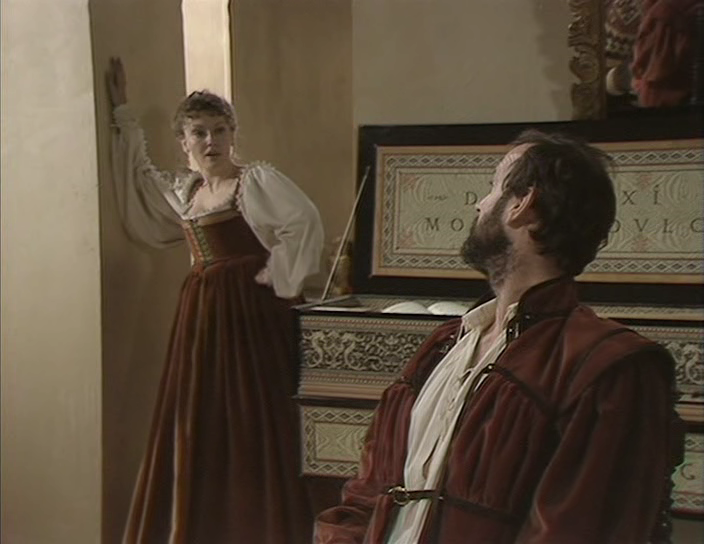
The opening broadcast of the BBC Television Shakespeare's third series, The Taming of the Shrew was the first production supervised by Jonathan Miller after he took over from Cedric Messina as series producer. While Messina's conservative, broadly 'realistic' approach sought to simplify Shakespeare for the masses, Miller assumed a more intelligent and literate audience. Accordingly, he adopted a much more stylised visual conception based around great paintings of the era in which the play was set - the patterning and symmetry of Vermeer's interiors were the chief inspiration here.
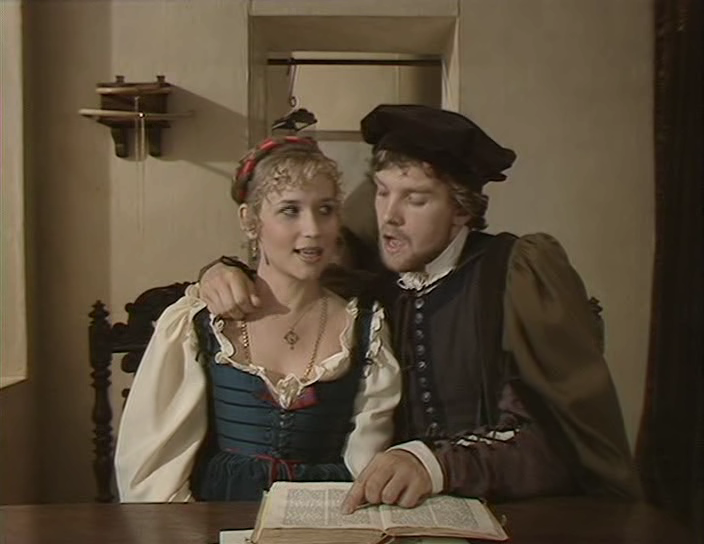
Miller was also more adventurous with casting. Not only had John Cleese never performed in Shakespeare professionally before, he was not particularly enthusiastic about most of the performances that he'd seen, and took some persuading from Miller that the BBC Shrew would not be, as Cleese feared "about a lot of furniture being knocked over, a lot of wine being spilled, a lot of thighs being slapped and a lot of unmotivated laughter."
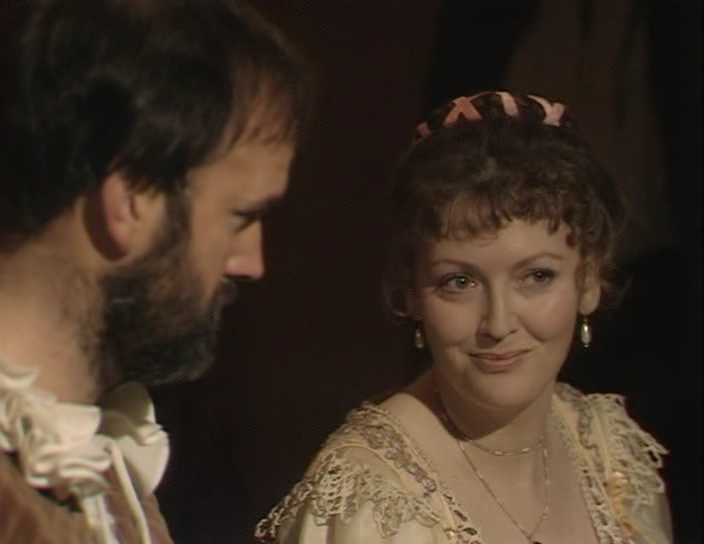
So despite Cleese's reputation as a manic physical comedian in the then recent Fawlty Towers (BBC, 1975/79), the production takes a cool, cerebral approach inspired by Miller's view of Petruchio as an early Puritan (the movement had its roots in Elizabethan England). Cleese's Petruchio is nothing like the traditional swaggering bully: despite some Basil Fawlty-like ear-tweaking of his servant at the start, his demeanour changes noticeably when he meets Katherine (Sarah Badel).
Instead of seeking to dominate her from the off, Petruchio appreciates her independence of spirit, and therefore decides to mould rather than tame her, demonstrating to her what effect her behaviour has on others, but at the same time letting her laugh at herself. This approach was emphasised by Badel's performance of a woman essentially driven by simultaneous fears: either of ending up with a man she doesn't respect (and therefore cannot love) or of never marrying at all, remaining on the sidelines while her younger sister Bianca (Susan Penhaligon) garners all the attention.
It's not a feminist reading - Miller acknowledged that this would be a distortion of the original text (presented mostly intact, the biggest cut being the removal of the opening Christopher Sly 'Induction') - but it does offer a convincing method of shifting its focus towards something more palatable for present-day audiences. This interpretative (and casting) gamble paid off handsomely, with the production regularly singled out as the most fondly-remembered of all the BBC Shakespeares.
Michael Brooke
http://rapidshare.com/files/114189780/THE_TAMING_OF_THE_SHREW_BBC.part01.rar
http://rapidshare.com/files/114190526/THE_TAMING_OF_THE_SHREW_BBC.part02.rar
http://rapidshare.com/files/114191257/THE_TAMING_OF_THE_SHREW_BBC.part03.rar
http://rapidshare.com/files/115307151/THE_TAMING_OF_THE_SHREW_BBC.part04.rar
http://rapidshare.com/files/114192824/THE_TAMING_OF_THE_SHREW_BBC.part05.rar
http://rapidshare.com/files/114193546/THE_TAMING_OF_THE_SHREW_BBC.part06.rar
http://rapidshare.com/files/114194329/THE_TAMING_OF_THE_SHREW_BBC.part07.rar
http://rapidshare.com/files/114195075/THE_TAMING_OF_THE_SHREW_BBC.part08.rar
http://rapidshare.com/files/114195800/THE_TAMING_OF_THE_SHREW_BBC.part09.rar
http://rapidshare.com/files/114196598/THE_TAMING_OF_THE_SHREW_BBC.part10.rar
http://rapidshare.com/files/114198109/THE_TAMING_OF_THE_SHREW_BBC.part11.rar
http://rapidshare.com/files/114198968/THE_TAMING_OF_THE_SHREW_BBC.part12.rar
http://rapidshare.com/files/114199164/THE_TAMING_OF_THE_SHREW_BBC.part13.rar
no pass
.jpg)






